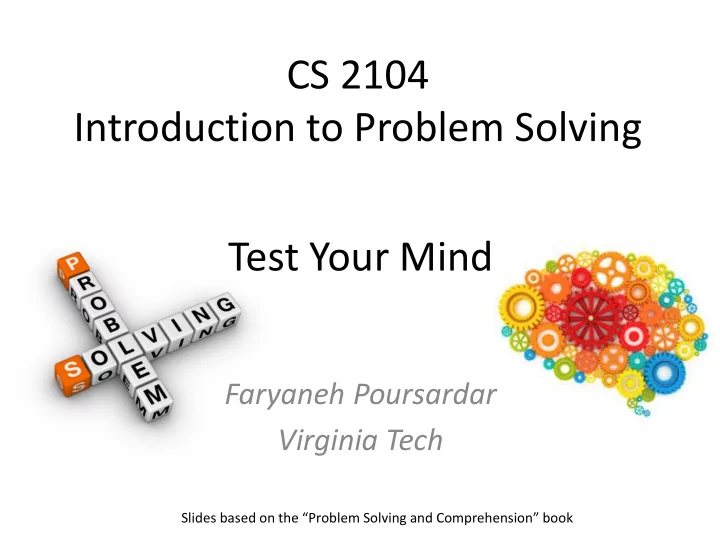

CS 2104 Introduction to Problem Solving Test Your Mind Faryaneh Poursardar Virginia Tech Slides based on the “Problem Solving and Comprehension” book
Goals: • I ncrease the students’ power to analyze problems • Learn to recognize and avoid ineffective problem- solving methods • Adopt the method that good problem solvers use • Practice in applying this method to a variety of comprehension and reasoning questions • Improve in their analytical thinking skills and, be more effective, and more confident problem solvers
WASI • Whimbey Analytical Skills Inventory (WASI) • Measures reasoning ability to find out about your thinking skills • Helps you to find out about your own thinking habits and compare them to other people • The type of test you might take in applying for a job • You can compare your problem-solving strategies
WASI • Notice the sequences of thoughts used by students who answered the question successfully. • Compare the approaches leading to the correct answer with those leading to incorrect answers. • Pinpoint how the approaches differ. • Most importantly, for every question that you answer incorrectly, • Be sure you understand exactly why the error occurred, and • How you can avoid such an error in the future.
What is the advantage? • Asking people to explain their answers to the test questions, and • to compare the explanations – learn from each other – understand how to attack problems effectively
• Take the test
Errors in Reasoning • Goal: Identify common types of errors and avoid them. • Many of these come up in the WASI – A major reason for taking it is so that you can self-identity errors that you tend to make • Many points are lost on tests/homeworks in school come from errors in reasoning, not from lack of knowledge or skills. • You can train yourself to reduce making this sort of mistake.
Type of Errors • Lack of knowledge or skill – Not our focus • Failure to observe and use all relevant facts of a problem – Reading so fast • Failure to approach the problem in a systematic manner, skip steps or jump to conclusion • Failure to spell out relationships fully • Being sloppy or inaccurate – making “simple” mistakes
Question 7 In a different language liro cas means “red tomato,” dum cas dan means “big red barn” and xer dan means “big horse.” What is the word for barn in this language? a. dum b. liro c. cas d. dan e. xer
Question 7 In a different language liro cas means “red tomato,” dum cas dan means “big red barn” and xer dan means “big horse.” What is the word for barn in this language? a. dum liro cas means “ red tomato” b. liro dum cas dan means “ big red barn ” xer dan means “ big horse” c. cas d. dan (a) (d) nonanalytical thinkers e. xer
Question 9 There are 3 separate, equal-size boxes, and inside each box there are 2 separate small boxes, and inside each of the small boxes there are 4 even smaller boxes. How many boxes are there altogether? a. 24 b. 13 c. 21 d. 33 e. some other number
Question 9 There are 3 separate, equal-size boxes, and inside each box there are 2 separate small boxes, and inside each of the small boxes there are 4 even smaller boxes. How many boxes are there altogether? a. 24 b. 13 c. 21 d. 33 (d) (b) inadequate reasoning e. some other number
Question 10 Ten full crates of walnuts weigh 410 lb, while an empty crate weighs 10 lb. How much do the walnuts alone weigh? a. 400 lb b. 390 lb c. 310 lb d. 320 lb e. 420 lb
Question 10 Ten full crates of walnuts weigh 410 lb, while an empty crate weighs 10 lb. How much do the walnuts alone weigh? a. 400 lb b. 390 lb c. 310 lb Total Weight: 410 Pounds d. 320 lb (c) :410 – 10*10 e. 420 lb Error: Not spelling numerical relationships out fully
Question 12 The first figure is related to the second figure in the same way that the third figure is related to one of the answer choices. Pick the answer.
Question 12 The first figure is related to the second figure in the same way that the third figure is related to one of the answer choices. Pick the answer. (d) Error: fail to search out and use all the available information (e) Neglecting to change the shading (c) Neglecting the size
Question 18 Cross out the letter after the letter in the word pardon which is in the same position in the word as it is in the alphabet.
Question 18 Cross out the letter after the letter in the word pardon which is in the same position in the word as it is in the alphabet. • Sample of a verbal reasoning problem • Cross out letter “o” • Errors: – fail to search out and use all the available information – Cross out “d” in “pardon” : • part of the problem has been lost – Cross out “d” in “word” : • Fail to work step-by-step through a complex sentence
Error Types Checklist • Inaccuracy in Reading • Inaccuracy in Thinking • Weakness in Problem Analysis; Inactiveness • Lack of Perseverance • Failure to Think Aloud – Want to practice for this course – As you work through the problem, vocalize thinking in detail, explain the steps – Solver/listener paradigm
Recommend
More recommend